
Latest News Regarding
Horn of Africa
Somalia, Kenya Presidents agreed to normalize bilateral relations and trade 10 Shares
FacebookFacebook messengerTwitterWhatsAppLinkedInTelegramEmail

Source: Hiiraan Online, Saturday July 16, 2022
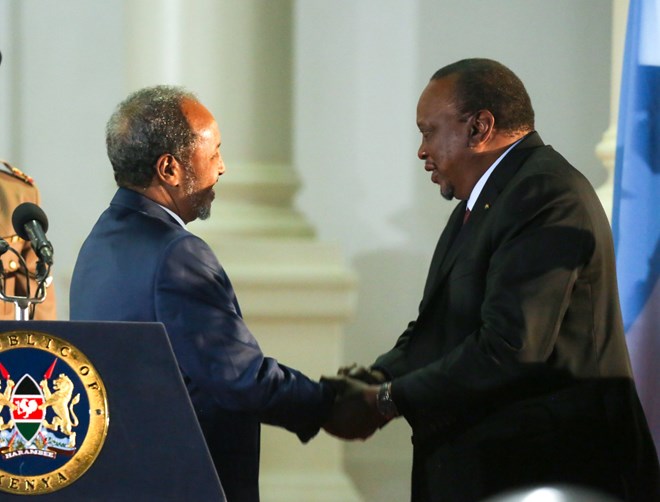
Nairobi (HOL) – Somali President Hassan Sheikh Mohamud and his Kenyan counterpart Uhuru Kenyatta signed an eleven-point agreement following bilateral talks at State House in Nairobi on Friday.
The two Presidents agreed to strengthen security, economic and political cooperation and to remove the barriers to immigration.
advertisementsAccording to the communique issued by the two governments, the leaders agreed on the resumption of the direct flights of Kenyan Airways between Mogadishu and Nairobi, the fish products of the Somalia Business Community to be allowed access to the Kenyan market and the resumption of Khat (Miraa) trade between Kenya and Somalia.
Mohamud and Kenyatta also agreed that borders between the two countries open and visas for diplomatic passport holders from both countries be issued on arrival, while Visa applications for other categories of passports be processed within 24 hours.
The communique added that the Joint Commission for Cooperation (JCC) between the two countries would convene in Mogadishu in August 2022.
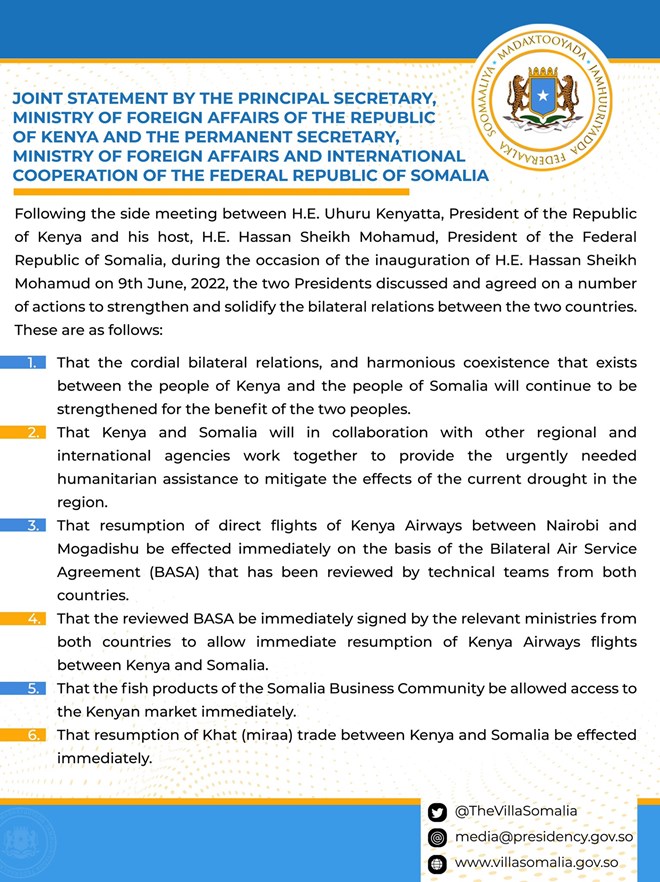
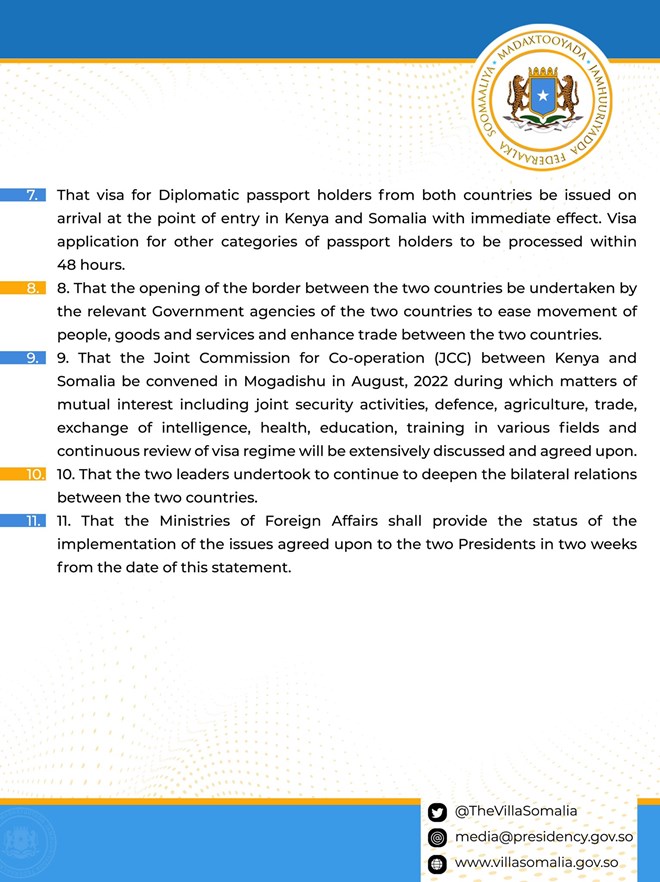
Somalia, Kenya Presidents agreed to normalize bilateral relations and trade

Saturday July 16, 2022

Nairobi (HOL) – Somali President Hassan Sheikh Mohamud and his Kenyan counterpart Uhuru Kenyatta signed an eleven-point agreement following bilateral talks at State House in Nairobi on Friday.
The two Presidents agreed to strengthen security, economic and political cooperation and to remove the barriers to immigration.
advertisementsAccording to the communique issued by the two governments, the leaders agreed on the resumption of the direct flights of Kenyan Airways between Mogadishu and Nairobi, the fish products of the Somalia Business Community to be allowed access to the Kenyan market and the resumption of Khat (Miraa) trade between Kenya and Somalia.
Mohamud and Kenyatta also agreed that borders between the two countries open and visas for diplomatic passport holders from both countries be issued on arrival, while Visa applications for other categories of passports be processed within 24 hours.
The communique added that the Joint Commission for Cooperation (JCC) between the two countries would convene in Mogadishu in August 2022.


2022/07/women-and-politics-in-somalia
Source: The Heritage Institute for Policy Studies published in July 2022 a report titled “Women and Politics: Overcoming Barriers of Political Representation in Somalia” by Ladan Affi and Zainab M. Hassan.
This report examines the public perception of women’s political participation as well as the opportunities and challenges they face in Somali politics.
Labels: constitution, elections, gender, governance, parliament, peacebuilding, politics, religion, Somalia, Somaliland, women
US Engagement with Africa
US Engagement with Africa
Source: The Hill published on 11 July 2022 a commentary titled “Time for a New US Engagement with Africa” by Tony Elumelu, African investor and philanthropist.
The author is encouraged that the United States intends to revive its relationship with Africa when it holds a second US-Africa Leaders’ Summit in September.
Labels: Africa, Antony Blinken, Biden administration, investment, US, US-Africa Leaders’ Summit
Ethiopia, Djibouti Ink MoU to Utilize Livestock Terminal at Djibouti’s Doraleh Multi-Purpose Port
Ethiopia, Djibouti Ink MoU to Utilize Livestock Terminal at Djibouti’s Doraleh Multi-Purpose Port
Walta
Source: Walta, Thursday July 14, 2022

A delegation led by Oumer Hussien Oba, FDRE Minister of Agriculture, signed a Memorandum of Understanding yesterday on the Utilization of the livestock terminal at Djibouti’s Doraleh Multi-Purpose Port with Mohammed Ahmed Awaleh, Minister of Agriculture, Water, Fisheries, Livestock, and Marine Resources of the Republic of Djibouti.
During his opening speech at the signing ceremony of the MoU, Oumer Hussien Oba stated that the agreement paves the way for Ethiopia, as a leading country in livestock population, to effectively use its resources by exporting live animals through proper quarantine and inspection services and enabling the country to significantly benefit from its livestock population by bringing in foreign currency earnings.
advertisementsThe Minister of Agriculture also expressed his government’s strong conviction for the terminal to be operational and function in accordance with the terms of the MoU, which requires joint commitment from both countries.
Mohammed Ahmed Awaleh, Minister of Agriculture, Water, Fisheries, Livestock, and Marine Resources of the Republic of Djibouti, for his part, noted that the increasing commercial ties between Ethiopia and Djibouti can serve as a testament to the two countries’ growing strategic partnership.
Furthermore, the Minister stated his government’s commitment to the effective implementation of the MoU signed between the two countries.
Ibrahim, Secretary-General of Ministry of Agriculture of the Republic of Djibouti, Fikru Regassa, State Minister of Agriculture of FDRE, Berhanu Tsegaye, Ambassador Extraordinary and Plenipotentiary of the FDRE, Djama Ibrahim Darar, General Manager of Doraleh MultiPurpose Port and Youssouf Moussa Dawaleh, Chairperson of Chamber of Commerce were present during the signing ceremony held at Doralleh Multipurpose port.
Recently, the government of Ethiopia invested in the construction of a standard quarantine facility in Mille (Afar regional state), which is located in close proximity to the port of Djibouti. This quarantine station has also recently been accredited, registered, and recognized by inspectors from the Kingdom of Saudi Arabia and the United Arab Emirates (UAE), allowing for the efficient delivery of animals intended for export while the regulatory aspect remains public goods.
Deputy Parliamentary Speaker insists Puntland was aware of humanitarian trip
Deputy Parliamentary Speaker insists Puntland was aware of humanitarian trip

Source: Hiiraan Online, Tuesday July 12, 2022

Mogadishu (HOL) – Somalia’s first deputy speaker of the Lower House, Sadiyo Yasin Samatar, has denied allegations by the Puntland regional state that the regional administration was unaware of her trip to Bossaso.
Samatar said that she informed the traditional elders and administration of the Bari region of her plans to travel to Bossaso with seven tonnes of humanitarian aid for the people of the Bari region.
advertisementsPuntland interior minister Mohamed Abdirahman Dhabanad told local media that the delegation did not contact authorities to arrange to receive them and added that Puntland is ready to work with the federal government.
She continued, saying that the pilot insisted he did not have enough fuel despite being told to return to Mogadishu while the plane was in the air. Samatar added that she contacted Ahmed Karaash, the vice president of Puntland, and had given the order for the food to be unloaded.
At least ten people were killed in a confrontation between Puntland Security Forces (PSF) and Puntland Maritime Police Force (PMPF) over receiving the aid. PSF forces waiting to escort the delegation clashed with PMPF forces implementing the order from authorities.
Somali President visits Somali army brigade trained in Eritrea
Somali President visits Somali army brigade trained in Eritrea

Source: Monday July 11, 2022
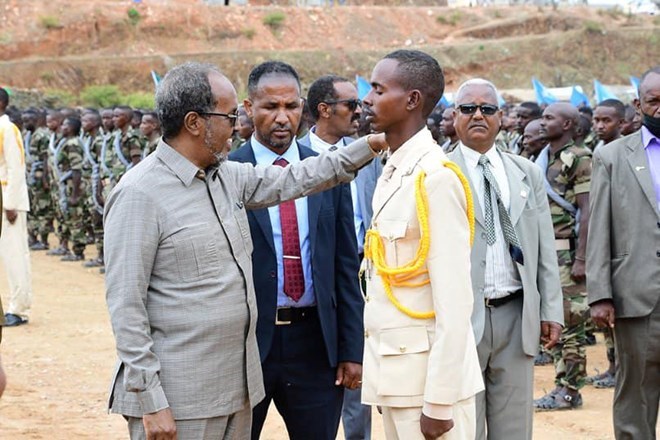
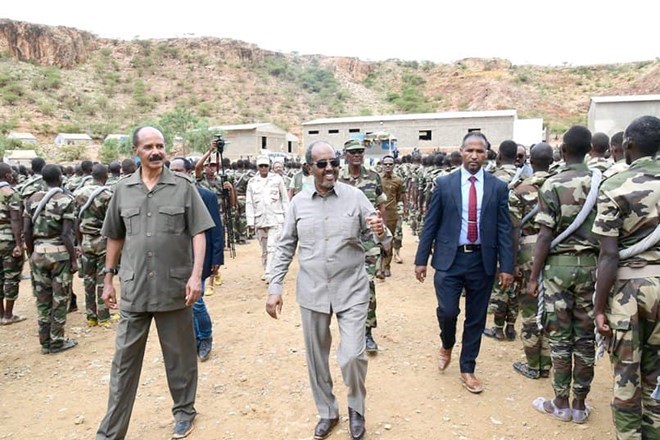
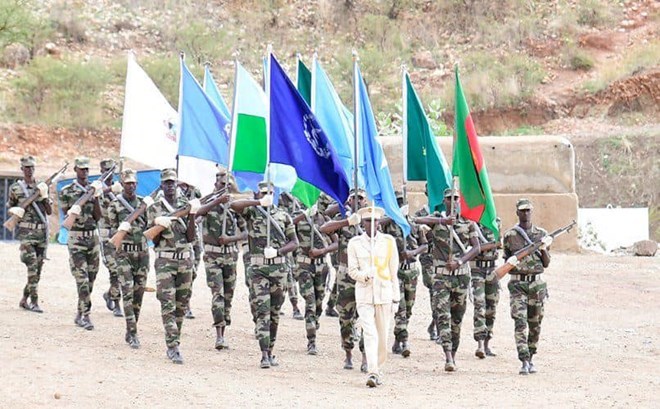
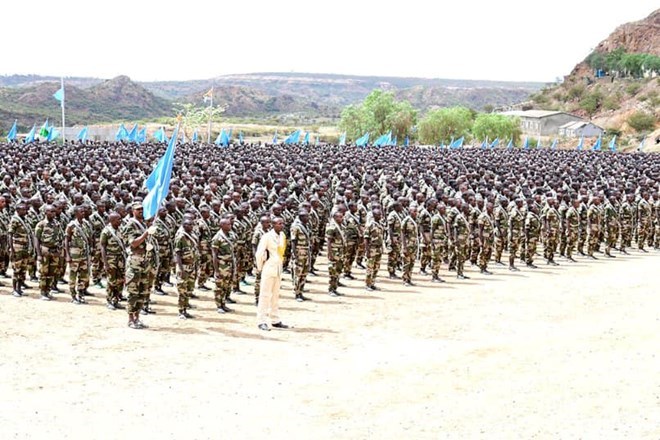
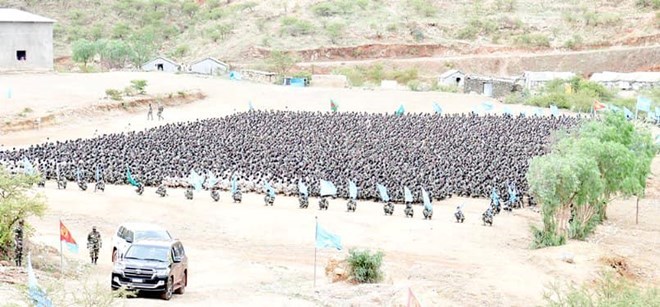
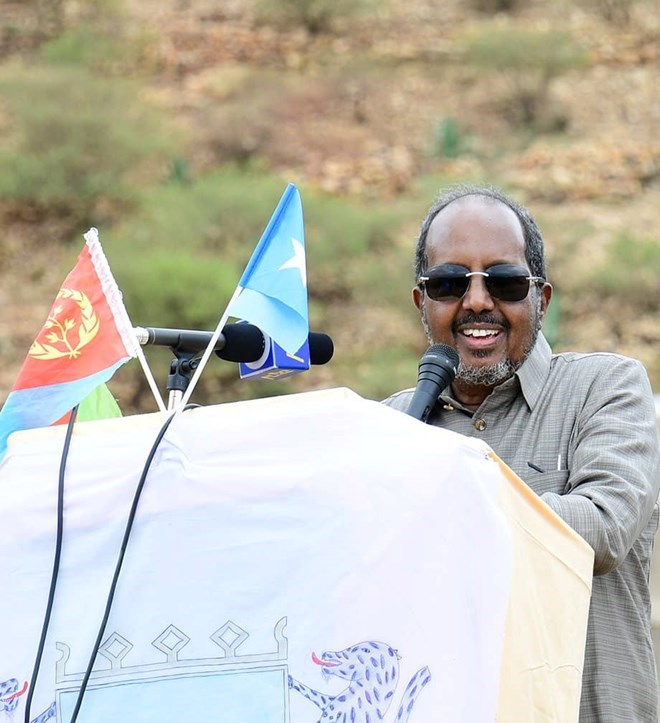

Mogadishu (HOL) – Somali President Hassan Sheikh Mohamud visited the Somali army brigade trained in Eritrea on Sunday.
Eritrean President Isaias Afwerki accompanied President Mohamud congratulated the recruits for completing the training.
advertisementsThe President’s visit marked the first time the Eritrean-trained Somali soldiers appeared in public.
The clandestine training program, launched by the Farmajo administration and managed by NISA, came under heavy criticism by opposition figures and family members of the soldiers.
The federal government and top military officials denied that the training program was in operation.
Former President Farmajo signed a tripartite security pact in Asmara with Ethiopia’s Abiy Ahmed and Eritrea’s Isaias Afwerki in September 2018.
Following his electoral defeat in May, Farmajo acknowledged that recruits were sent to Eritrea for training. He added that they would have been repatriated sooner but that the heightened tensions created by the protracted elections delayed their return.
Last year, a UN report alleged that Eritrea-trained Somalia troops fought alongside Eritrean soldiers in the Tigray war and committed war crimes during the conflict.
President Mohamud announced that the five thousand recruits who completed their training last year would return home to participate in the new offensive campaign against Al- Shabaab.
Large Protests Continue in Sudan
Source: Reuters published on 1 July 2022 an article titled “Eight Killed in Sudan as Protesters Rally on Uprising Anniversary.”
Large crowds demonstrated against Sudan’s military government on 30 June. At least 8 protesters died, and the government ordered the internet shut down.
Labels: Abdel Fattah al-Burhan, AU, internet, protests, Sudan, UN, US
World Bank approves $180m for refugees, host communities in Ethiopia
World Bank approves $180m for refugees, host communities in Ethiopia

Source: Sudan Tribune, Friday July 1, 2022

The World Bank has approved the second phase of the Development Response to Displacement Impacts Project in the Horn of Africa (DRDIP II) for $180 million in International Development Association (IDA) financing to help Ethiopia improve access to basic social and economic services, expand livelihood opportunities, and enhance environmental management for refugees and their host communities.
The fund, it said in a statement, will benefit approximately 2.5 million people in Ethiopia, of whom one-third are refugees and at least 50% are women.
advertisementsThis ongoing project, according to the World Bank, has already assisted over 5 million people in Djibouti, Ethiopia, Kenya and Uganda since 2016.
“DRDIP II activities will complement humanitarian support for refugees and host communities,” said Boutheina Guermazi, World Bank Director of Regional Integration for Africa, the Middle East and North Africa.
She added, “This will help the ongoing transformation of the government’s refugee response approach from a short-term humanitarian model into a more sustainable and long-term development approach.”
DRDIP II will reportedly expand the geographic scope of the project to cover all communities in Ethiopia affected by refugees’ presence and to deepen support for the implementation of the government’s refugee inclusion policies.
Refugees are included as direct beneficiaries of this new phase, and their concerns will be better integrated into local development planning with a special focus on women’s economic and social empowerment, the World Bank noted.
Currently, Ethiopia is third largest refugee hosting country in Africa and the ninth largest worldwide. Majority of the refugees from South Sudan, Somalia and Eritrea reportedly face protracted displacement due to regional instability.
IGAD expresses concern over Ethiopia-Sudan border dispute
IGAD expresses concern over Ethiopia-Sudan border dispute

Source: XINUanet, Friday July 1, 2022

Ethiopia and Sudan have longstanding competing claims over the Al-Fashaqa border region, an area of fertile land settled with Ethiopian farmers that Sudan claims is within its boundary
The Intergovernmental Authority on Development (IGAD) on Wednesday expressed concern over the Ethiopia-Sudan border dispute.
“The Executive Secretary calls on the two sisterly countries to exercise utmost restraint and avoid actions that can further heighten tensions and to actively seek diplomatic means to find a lasting and sustainable solution on the matter,” an IGAD statement said.
advertisementsBoth Ethiopia and Sudan are founding members of IGAD, an East African trading and security bloc of eight nations founded in 1986.
The eight IGAD member states are Ethiopia, Eritrea, Djibouti, Kenya, Somalia, Sudan, South Sudan and Uganda.
Earlier on Wednesday, the Chairperson of the African Union (AU) Commission Moussa Faki Mahamat also called on Ethiopia and Sudan to exercise restraint and initiate dialogue regarding their border dispute.
Ethiopia and Sudan are currently accusing each other of “provocations” over a deadly border incident that happened last week.
On Monday, Sudan decided to file a formal complaint to the United Nations Security Council against Ethiopia, while the Sudanese foreign ministry decided to immediately recall its ambassador to Ethiopia for consultations and to summon the Ethiopian ambassador in Khartoum to inform him of Sudan’s condemnation.
On Tuesday, the Ethiopian army rejected allegations that it executed seven captive Sudanese soldiers and instead accused Sudan of engaging in military provocations against Ethiopia.
Ethiopia and Sudan have longstanding competing claims over the Al-Fashaqa border region, an area of fertile land settled with Ethiopian farmers that Sudan claims is within its boundary.
Kenya finalising miraa trade deal with Mogadishu
Kenya finalising miraa trade deal with Mogadishu

Source: Business Daily, Friday July 1, 2022

Miraa traders in Maua town. FILE PHOTO | NMG
The government is finalising the protocols that will lead to a resumption of the multi-billion-shilling miraa market in Somalia following the bilateral talks between the two countries early this month that resolved the standoff.
Agriculture Cabinet secretary Peter Munya has announced that the export of khat to Somalia is set to resume on July 5, coming as a relief to thousands of miraa farmers who have in the last three years been counting losses following the closure of the Mogadishu market.
Head of Miraa, Pyrethrum and other Industrial Crops Felix Mutwiri said they are working on outstanding issues ahead of resuming Kenya’s single largest market.
advertisements”Following the bilateral meeting between President Uhuru Kenyatta and his Somalia counterpart, we are now finalising on the outstanding issue as we plan to start exporting to Somalia,” he said.
However, miraa traders are concerned that the government has left them out in the ongoing talks.
“We have just been told that the market will resume on July 5, however, we are not being involved in the ongoing conversation,” said Kimathi Munjuri, chairman of Nyambene Miraa Traders Association.
Mr Munjuri said traders are set to resume the export and they are waiting for a word from the government on the strategies that have been put in place.
Traders have been relying on the local market for the last three years after Mogadishu banned the export of the stimulant following a diplomatic row between the two countries.
The move saw Kenya embark on scouting for a new market in Djibouti to save farmers who rely on the crop as their main economic mainstay.
Djibouti is getting most of its khat supply from Ethiopia, however, there is a huge deficit for the stimulant as Addis Ababa is unable to meet its total demand.
The directorate said that even with the resumption of the Somali market, they are still targeting European countries, which in 2014 banned the crop after it was classified as a drug.
“We are still keen on going back to Europe and other key markets such as Israel that have shown interest in our miraa,” said Mr Mutwiri
UN-Habitat training to enhance service delivery in Somaliland
UN-Habitat training to enhance service delivery in Somaliland

Source: AfricanBusiness, Thursday June 30, 2022
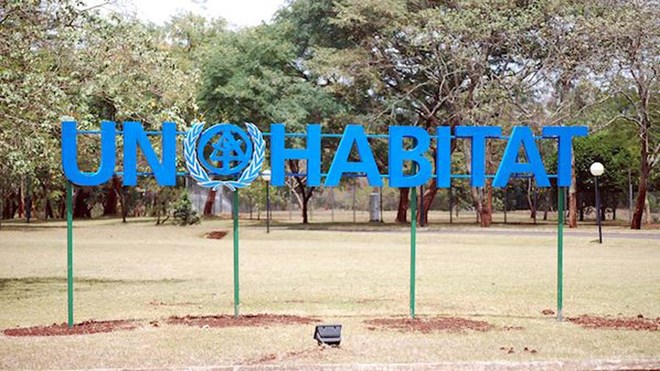
As part of its mandate to deliver capacity building to local officials to enhance delivery of equitable social services, UN-Habitat and partners this month provided training for dozens of local officials.
The five-day training to 97 mayors and deputy mayors were delivered under the Joint Programme on Local Governance and decentralization (JPLG) in partnership with Somaliland’s Ministry of Interior.
The Local Leadership Management (LLM) training was delivered in Hargeisa, Burao and Borama, three separate districts of Somaliland. The goal is to make local governments effective sub-national structures which are able to deliver basic social services.advertisements“This training provided a detailed overview of key functions of an elected local councilor. These included policy development, financial management, conflict resolution, community empowerment and institutional development, to mention a few. The training is primarily intended for elected local councilors and key municipal staff.,” said Abdirahman Mahmoud, UN-Habitat, JPLG Programme Manager
Somaliland Minister of Interior Mohamed Kahin Ahmed, who officially opened the training in Hargeisa, urged the participants to capitalize on the training and use that experience, knowledge and skills to accelerate the achievement of better services to the citizens they serve.
“Other than capacity building, this training offers a platform for experience sharing having brought together, in one room, almost all local councilors across Somaliland,” he said.
The Mayor of Hargeisa, Abdikarim Ahmed Mooge, also challenged the participants to be attentive and learn as the task of the municipalities is a new experience to most of the elected councilors, while also appreciating UN-Habitat and JPLG for continuously equipping new officials who take up municipal roles.
“From this training, I learnt some of my responsibilities as an elected councilor being; coordinating and supporting the creation of an enabling environment for sustained economic growth and development, said Mr. Mohamed Hirsi Ahmed, a councilor from Buroa local council.
“It is also my job, and that of my fellow of elected local councils to plan, deliver and improve equitable access to social services and infrastructure,” he added
The program is jointly delivered by UN-Habitat, UNDP, UNICEF, ILO and UNCDF and is funded by Sweden, Norway, Denmark, Switzerland, Holland and the EU.
Sudan’s military strikes disputed region bordering Ethiopia
Sudan’s military strikes disputed region bordering Ethiopia

Source: Aljazeera, Thursday June 30, 2022
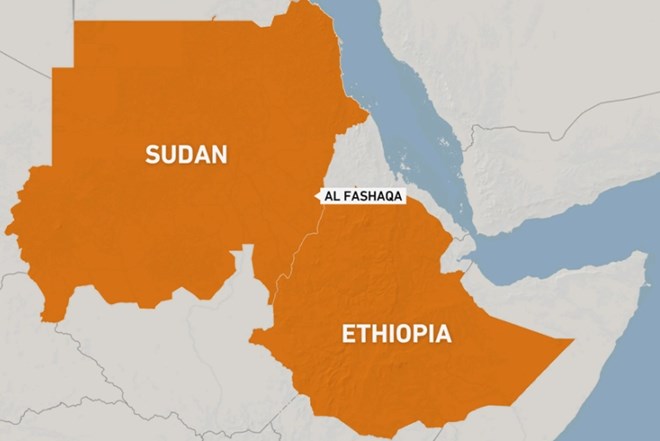
Sudan’s armed forces fired heavy artillery during clashes in the disputed eastern region of al-Fashaqa bordering Ethiopia, an Ethiopian official said, the latest salvo in a long-running feud over their shared border.
Sudan was able to capture Jabal Kala al-Laban, an area near the contested border, on Tuesday following an artillery barrage and an air raid, according to an anonymous Sudanese military source speaking to Reuters news agency.advertisementsOn Monday, Ethiopia denied Sudan’s accusation that its army had captured and executed seven Sudanese soldiers and a civilian, instead blaming the killings on a local fighter group.
Sudanese government sources said Sudan had filed a formal complaint with the United Nations Security Council over the killings.
Sudan’s army fired long-distance artillery from Monday morning until Tuesday afternoon, but nobody was injured, said Assefa Ashege, a senior security official in Ethiopia’s Amhara region.
Two local residents said the Sudanese army had gained control of Jabal Kala al-Laban and had destroyed a military base there. It was unclear if the base belonged to the Ethiopian army or an allied fighter group.
A Sudanese military spokesperson did not respond to a request for comment. Ethiopia’s government spokesperson Legesse Tulu did not immediately respond to requests for comment.
Ethiopian military officials referred Reuters to a statement issued on Monday that described a previous border clash, but did not comment on the reported shelling.
In a statement, Sudan’s military disputed what it said were reports of movements and the taking of prisoners.
The quarrel over al-Fashaqa, which lies within Sudan’s international boundaries but has been settled by Ethiopian farmers for decades, has escalated in recent years alongside a diplomatic spat over Ethiopia’s construction of a hydropower dam.
SOURCE: AL JAZEERA AND NEWS AGENCIES
Rising Tension between Ethiopia and Sudan
Rising Tension between Ethiopia and Sudan
Source: The Associated Press published on 29 June 2022 an article titled “African Union Urges Calm in Ethiopia-Sudan Border Dispute.”
The African Union is deeply concerned by “the escalating military tension” between Ethiopia and Sudan. Following the alleged execution of 7 Sudanese soldiers and one civilian by Ethiopia, Sudan launched an artillery barrage against a village inside Ethiopia.
Labels: AU, border conflict, Ethiopia, Sudan
Somalia: A Timeline for Al-Shabaab
Somalia: A Timeline for Al-Shabaab
Source:The International Crisis Group (ICG) posted on 22 June 2022 “Al-Shabaab Militancy in Somalia: A Timeline.”
The ICG has developed an interactive timeline beginning in 2006 that explains how al-Shabaab came into existence and how it evolved.
Labels: al-Shabaab, history, insurgency, sharia courts, Somalia, terrorism
An Opening for Peace in Ethiopia?
An Opening for Peace in Ethiopia?
Source: World Politics Review published on 21 June 2022 a commentary titled “Ethiopia Just Might Have a Chance for Peace” by Adem Kassie Abebe, International Institute for Democracy and Electoral Assistance.
A reduction of tension between the central government and Tigray region, more humanitarian aid reaching Tigray, and the realization that a “war at whatever cost” is untenable opens the door for a potentially successful national dialogue in Ethiopia
Labels: Abiy Ahmed, Afar Region, Amhara Region, AU, China, civil war, Eritrea, Ethiopia, humanitarian aid, IDPs, inflation, national dialogue, OLA, Oromia, Prosperity Party, Tigray Region, TPLF, US
Climate Security and Peacebuilding in Somalia
Climate Security and Peacebuilding in Somalia
Source: The Stockholm International Peace Research Institute published in June 2022 a study titled “Towards an Integrated Approach to Climate Security and Peacebuilding in Somalia” by Emilie Broek and Christophe M. Hodder.
The study explores the linkages between climate security and peacebuilding processes in Somalia. Worsening climatic conditions are challenging livelihoods and altering the physical surroundings and security upon which people depend.
Labels: al-Shabaab, climate change, conflict, drought, environment, flooding, governance, IDPs, migration, peacebuilding, security, Somalia, UN, UNSOM
UK names new envoy for Horn of Africa
UK names new envoy for Horn of Africa

Source: AFP, Thursday June 23, 2022
Britain has named a new envoy for the Horn of Africa and the Red Sea, a strategic region beset by multiple security and humanitarian crises.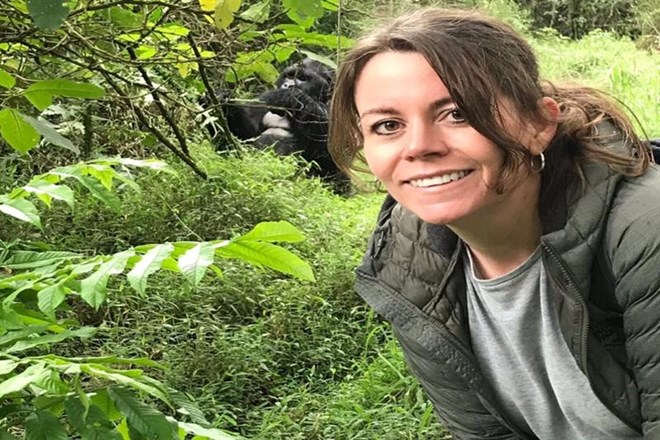
Sarah Montgomery, UK Special Envoy for the Red Sea Horn of Africa. Photo courtesy of her official Twitter account @SEMontgomery.
The appointment of diplomat Sarah Montgomery was announced Tuesday just as Beijing’s special envoy to the Horn of Africa was in Ethiopia seeking to play a greater role in the region.
“From a humanitarian crisis enveloping the Horn of Africa to our deepening ties across the Gulf, the UK’s relationship with the Red Sea region is at a critical juncture,” Britain’s Minister for Africa Vicky Ford said in a statement.
advertisementsThe Horn of Africa has a strategic position opposite the Arabian Peninsula and the Gulf of Aden.
Montgomery was previously at the British embassy in Washington and also held senior roles in the Gulf, Yemen and Iran section at the UK’s National Security Secretariat, the statement said.
“Her experience on security issues in the Gulf indicates that the Red Sea will be her focus,” Ben Hunter, East Africa analyst at risk intelligence company Verisk Maplecroft, told AFP.
“Saudi Arabia and the UAE have become major security and economic players in the Horn.”
Three countries in the region, Ethiopia, Kenya and Somalia, are in the grip of a punishing drought, with warnings that Somalia is at risk of famine.
Northern Ethiopia has been engulfed in a war that erupted in November 2020 between government forces and Tigrayan rebels, and the country is also being shaken by several local conflicts of varying intensity.
China’s special envoy Xue Bing, who was appointed to the role in February, said Tuesday after a two-day regional conference in Addis Ababa that Beijing wanted to play a “more important role” in promoting peace and security in the Horn.
The United States earlier this month named veteran diplomat Mike Hammer as its latest envoy for the Horn with the delicate task of building on Ethiopia’s fragile efforts towards peace.
South Sudan fights child marriage where girls sold for cows
South Sudan fights child marriage where girls sold for cows
AP, By DENG MACHO, 22 June 2022

Nyanachiek Madit, 21, who successfully refused when her father told her at age 17 that she would be married off to a man about 50 years old because her family couldn’t afford to send her to school, speaks to The Associated Press in Juba, South Sudan on Wednesday, June 8, 2022. Some young girls are auctioned off into marriage for cows in South Sudan – a practice that the government and international organizations are fighting to promote better health and educational opportunities. (AP Photo/Deng Machol)
JUBA, South Sudan (AP) — Some young girls are still auctioned off into marriage for cows in South Sudan — one of the social challenges that activists had hoped to highlight during Pope Francis’ now-postponed visit.
The price of a daughter, determined in negotiations between her father and would-be husband, is typically 50 to 100 cows, each worth up to $1,000. A girl viewed as beautiful, fertile and of high social rank can bring as many as 200 cows. One girl in a well-publicized case a few years ago was auctioned off for 520 cows, plus cars.
“The younger the girl marries, the more the family gets cattle in return,” said Jackline Nasiwa, executive director of the Center of Inclusive Governance, Peace and Justice in South Sudan’s capital, Juba. “They sell their daughters so that they get something to survive.”
Though South Sudanese law limits marriage to those age 18 and over, it’s rarely enforced, particularly in rural areas.ADVERTISEMENThttps://858497ad530a9c78626650c70b89724d.safeframe.googlesyndication.com/safeframe/1-0-38/html/container.html
South Sudan’s independence from Sudan in 2011 brought widespread hope for prosperity and peace for the country’s 12 million people, but little of that has materialized.
The new country quickly plunged into five years of civil war that ended with a fragile peace deal in 2018, but deadly intercommunal violence continues, and most people remain trapped in poverty. Climate shocks like flooding, along with rising food prices caused by Russia’s invasion of Ukraine, have deepened widespread hunger.
Somalia: ‘The worst humanitarian crisis we’ve ever seen
Somalia: ‘The worst humanitarian crisis we’ve ever seen’

Source: Guardian, Thursday June 23, 2022
By Lizzy Davies
Children starving to death ‘before our eyes’ say aid workers as G7 leaders warned only ‘massive’ and urgent funding will avert famine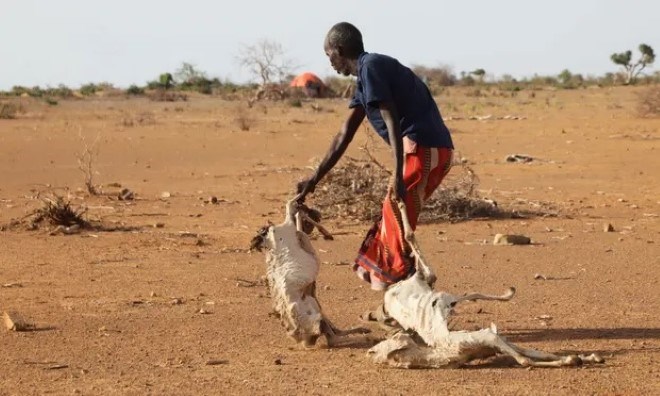
A Somali man disposes of his dead livestock in a country that has seen its worst drought in 40 years. Photograph: Feisal Omar/Reuters
Only a “massive” and immediate scaling-up of funds and humanitarian relief can save Somalia from famine, a UN spokesperson has warned, as aid workers report children starving to death “before our eyes” amid rapidly escalating levels of malnutrition.
In a message to G7 leaders who are meeting from Sunday in Germany, Michael Dunford, the World Food Programme’s (WFP) regional director for east Africa, said governments had to donate urgently and generously if there was to be any hope of avoiding catastrophe in the Horn of Africa country.
“We need money and we need it now,” said Dunford. “Will we able to avert [a famine in Somalia]? Unless there is … a massive scaling-up from right now, it won’t be possible, quite frankly. The only way, at this point, is if there is a massive investment in humanitarian relief, and all the stakeholders, all the partners, come together to try to avert this.”
advertisementsThe Horn of Africa has suffered four consecutive failed rainy seasons and is experiencing its worst drought in four decades, a climate shock exacerbated by ongoing conflict and price rises caused by the Russian invasion of Ukraine. Across the whole of east Africa, 89 million people are now considered “acutely food insecure” by the WFP, a number that has grown by almost 90% in the past year.
“Unfortunately, I do not see [that rate of growth] slowing down. If anything, it seems to be accelerating,” said Dunford.
Last year, the UK and other G7 leaders promised to provide $7bn (£5.7bn) to help countries prevent famine, but appeals for east Africa have not managed to raise enough funds to stave off hunger.
Now those same leaders are being urged to commit to an immediate funding package as Somalia, the worst-affected country, descends into catastrophe. By September, at least 213,000 people in the worst-hit areas are expected to be facing famine, according to the latest Integrated Food Security Phase Classification (IPC) report.
On a recent visit to the country, Claire Sanford, deputy humanitarian director of Save the Children, said she met mothers who had already buried multiple children in the last year, and whose surviving children were now suffering severe malnutrition. One acutely malnourished three-month-old baby whom Sanford met “never made it through the night, and we heard of a number of stories where that was the case”.
“I can honestly say in my 23 years of responding to humanitarian crisis, this is by far the worst I’ve seen, particularly in terms of the level of impact on children,” she said. “The starvation that my colleagues and I witnessed in Somalia has escalated even faster than we feared.”
In 2011, Somalia experienced a famine that killed more than 250,000 people, mostly children, but Sanford said many of the people she met said the conditions now were even worse.
“We have genuinely failed as an international community that we have allowed the situation to get to the extent it is at the moment. In 2011, we vowed as a community that we would never, ever let this happen again. And yet we have failed in that promise,” she added.
Dunford said inadequate funding had hampered efforts to learn from the 2011 famine. “We are seeing children dying before our eyes, seeing populations that have lost their livelihoods. It’s not that we didn’t learn the lessons of 2011; there was a lot of very good learning from that crisis. It’s just we haven’t been able to implement it to the extent required because of the lack of funding.”
In April, the UN had received only 3% of funds for its $6bn appeal for Ethiopia, Somalia and South Sudan.
Danny Sriskandarajah, chief executive of Oxfam GB, said the current crisis was partly due to the British government’s “compassion failure” and decision to slash the overseas aid budget by £4.6bn last year.
According to the latest IPC assessment for Somalia, an estimated 1.5 million under-fives face acute malnutrition by the end of the year, including 386,400 who are likely to be severely malnourished. Those numbers are only expected to go up.
President Hassan Sheikh held talks with UAE counterpart for first State visit during second term
President Hassan Sheikh held talks with UAE counterpart for first State visit during second term

Source: Hiiraan Online, Thursday June 23, 2022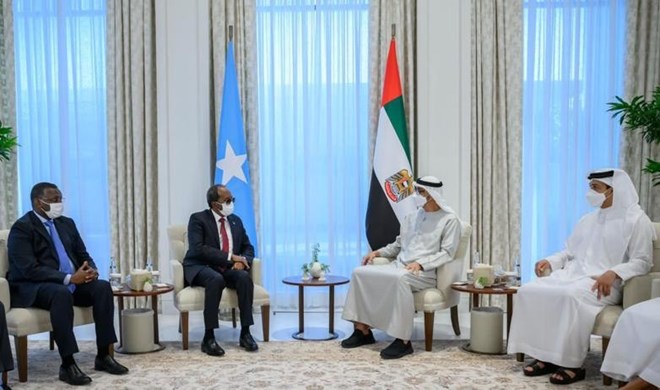
Abu Dhabi (HOL) – Somali President Hassan Sheikh Mohamud held talks with the President of the UAE, Mohamed Bin Zayed, in Abu Dhabi on Wednesday during an official state visit to the UAE.
The President was received at the Qasr Al Shati’ Palace, where the UAE president welcomed the Somali leader’s visit and congratulated him on his election to Somalia’s presidency.
advertisementsThe two heads of state addressed the prospects of enhancing cooperation between the two nations. The two sides discussed the ongoing efforts to establish peace in Somalia.
According to Villa Somalia, the two sides agreed to improve cooperation on security, trade and development.
“The two leaders discussed issues of mutual interest, including strengthening bilateral ties.”
These discussions will likely focus on Somalia seeking a more robust partnership in security, the economy, humanitarian crisis and trade.
From the UAE side, the meeting was attended by Sheikh Mansour bin Zayed Al Nahyan, Deputy Prime Minister and Minister of Presidential Affairs; Sheikh Hamdan bin Mohamed bin Zayed Al Nahyan; Sheikh Shakhboot bin Nahyan bin Mubarak Al Nahyan, Minister of State; and Dr. Anwar Gargash, Diplomatic Adviser to UAE President; along with Ali bin Hammad Al Shamsi, Deputy Secretary-General of the Supreme National Security Council and Mohamed Ahmed Al Othman, UAE Ambassador to Somalia.
According to sources, the UAE is poised to reengage with Somalia and is reportedly planning several initiatives, including a $20M donation to drought relief efforts and resuming direct flights to Mogadishu. There are also plans to reopen Sheikh Zayed hospital, which closed in 2018 after a disagreement with Somalia’s previous government led by Mohamed Abdullahi Farmajo.
President Mohamud’s visit marked the first time a Somali president visited the UAE in nearly five years. While officially neutral, former President Mohamed Abdullahi Farmajo strengthened relations with Qatar at the expense of other Gulf nations during the 2017 Gulf Crisis. Qatar enjoyed close ties with Somali President Farmajo, whose chief of staff, intelligence director and national security advisor, Fahad Yasin, previously worked on his successful electoral campaign as a Qatari liaison
